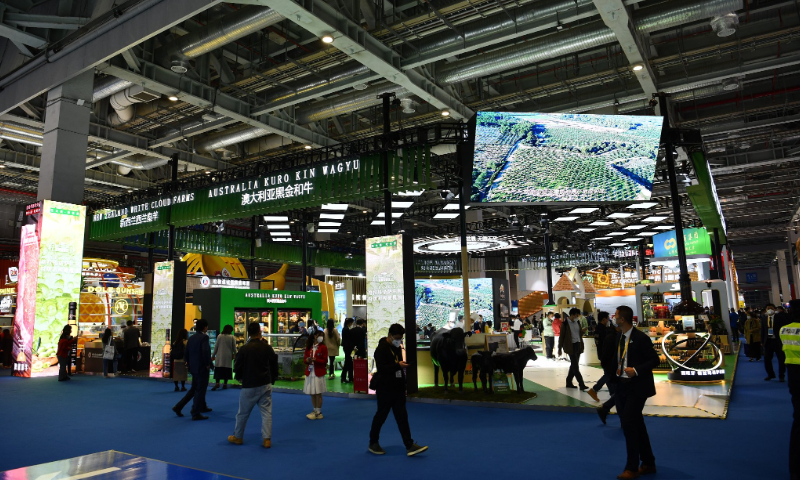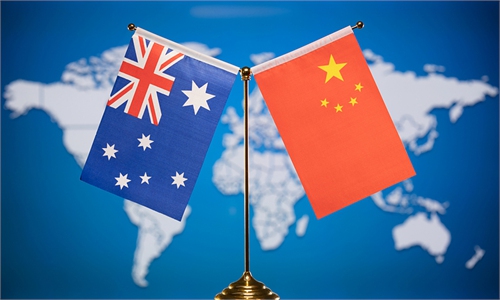Australia needs 'political wisdom' amid US pressure when seeking better ties with China: expert

The booth of Australia Kuro Kin Wagyu at the fifth China International Import Expo on November 5, 2022. Photo: VCG
Chinese State Councilor and Foreign Minister Wang Yi on Tuesday held a phone conversation with Australian Foreign Minister Penny Wong, who vowed that Australia will continue to adhere to the one-China policy and develop more stable and mutually beneficial relations with China on the basis of mutual respect, according to the Xinhua News Agency.
The phone call, which took place at Wong's request, was held as Australian businesses are seeking opportunities in the Chinese market at the ongoing 5th China International Import Expo (CIIE) in Shanghai.
Such developments show that facing growing economic challenges at home, the Australian government is apparently seeking to improve ties with China, a Chinese expert said on Tuesday. However, Australian leaders need "political wisdom" to deal with the US meddling and internal pressure in order to improve ties, the expert said.
Wong said that Australia does not wish to magnify existing differences, and is ready to properly handle specific issues in a responsible manner within the framework of the Australia-China comprehensive strategic partnership while making continuous efforts to improve and strengthen the two countries' relations, Xinhua reported.
Wang said the common interests of China and Australia far outweigh their differences, and the easing and improvement of China-Australia relations conforms to the fundamental interests of both sides and the common expectations of the two peoples and the international community.
The latest talk between the two foreign ministers offers new possibilities for improved economic and trade ties after the two countries' relations fell to the lowest ebb in decades due to the hostile foreign policy of the previous Australian administration, experts said.
Since the new Australian administration came to power, the country has adopted an active attitude toward foreign policy, which is reflected in the recent frequent meetings and talks between the two high-level government officials, experts said.
"We can see that Australia's new government has started to adopt a relatively prudent attitude, which is apparently different from the previous Morrison administration's hostile and often provocative practice toward China at every turn," Chen Hong, president of the Chinese Association of Australian Studies and director of the Australian Studies Centre at East China Normal University, told the Global Times on Tuesday.
Although Australia's overall policy is still closely conjoined with the US Indo-Pacific strategy, there have been notable, though gradual, changes in its approach, which shows that Canberra does have the intention to work toward diplomatic reconciliation between the two countries, Chen said.
Meanwhile, Australian companies are actively participating in the ongoing CIIE, the world's biggest import fair, and have inked new deals. Australian firms are among the most active participants this year, with a total of 64 companies in sectors ranging from agricultural products to mining attending the event.
Companies such as Rio Tinto have struck new deals with Chinese business partners at the expo.
In a strategic cooperation memorandum that the Anglo-Australian mining group signed with China's state-owned miner Sinomine Resource Group at the CIIE, the two sides pledged to focus on cooperation in the field of iron ore and the steel industry chain supply chain, including promoting carbon reduction in the industry and strengthening cooperation in the development of mineral resources, according to a statement that Rio Tinto sent to the Global Times on Tuesday.
Rio Tinto has been exporting iron ore from Western Australia to China since 1973, and has supplied China with more than 3.5 billion tons of iron ore so far, according to the company.
China is the number one destination market for Australian iron ore, with more than 60 percent of it going to the Chinese market, making the sector part of the backbone of Australia's economy.
China is also the major market for various other Australian goods ranging from wine to beef and lobsters, but trade has been affected by the deterioration in relations.
Experts said that this year's active participation shows that Australia feels the urgent need to get out of the current economic quagmire, in contrast to last year, during which the Australian side clearly stated that it would not organize a group to participate.
"Under the current situation of Australia's stagflation, if the country could revitalize or even strengthen its economic and trade exchanges with China, it would be something to look forward to, with the new government eager to revive the economy," Chen said.
However, there is still some way to go before bilateral relations get back to normal again, especially as the Australian side is still facing US pressure to "decouple from China" and there are some right-wing anti-China forces at home.
"The Albanese government needs to have the political wisdom to steer Australia's relationship with China out of the current freeze, instead of letting it freefall to further deterioration. After all, Australia has its own national interests to look after, rather than acting as a pawn to serve Washington's hegemonic strategy," Chen said.
"The new government has brought about a new climate for possible improvement of the bilateral relations, and we hope that there will be practical results," the expert added.

